
 |
||||||
|
GAY
FILM REVIEWS BY MICHAEL D. KLEMM
|
||||||
|
Swimming With Lesbians 2009 Director: Starring: Unrated, 68 minutes |
Pride
And Protest
"This
is a working class, impoverished rust belt city on the edge of the Midwest.
We have done some amazing things coming out of that context." |
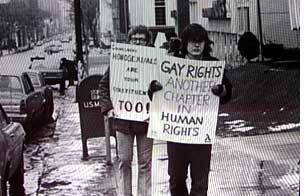 Oral
histories are important. Through them, witnesses to history have their lives
and their stories preserved for subsequent generations to study and to learn
from. Swimming With Lesbians,
a radical documentary by Rochester filmmaker David Marshall, chronicles
many of the important voices that have emerged from my native Buffalo, NY's
eclectic gay, lesbian and transgender history. Folks, it didn't all
happen in New York City and San Francisco. Oral
histories are important. Through them, witnesses to history have their lives
and their stories preserved for subsequent generations to study and to learn
from. Swimming With Lesbians,
a radical documentary by Rochester filmmaker David Marshall, chronicles
many of the important voices that have emerged from my native Buffalo, NY's
eclectic gay, lesbian and transgender history. Folks, it didn't all
happen in New York City and San Francisco. |
|
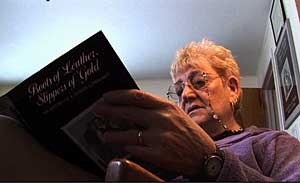 The
film's Mistress of Ceremonies is Madeline Davis, one of Buffalo's leading
players on the GLBT stage. For starters, Ms. Davis is the founder and curator
of the Madeline Davis
GLBT Archives Of WNY and much of the film is centered on this unique
historical treasury. A longtime political activist, Davis made history by
addressing the 1972 Democratic National Convention at the age of 32, identifying
herself as a lesbian, and demanding the inclusion of a gay rights plank.
In 1971, she recorded a folk song entitled "Stonewall Nation." It was the
first gay anthem - think Joni Mitchell's "Woodstock" but with a different
political bent. The
film's Mistress of Ceremonies is Madeline Davis, one of Buffalo's leading
players on the GLBT stage. For starters, Ms. Davis is the founder and curator
of the Madeline Davis
GLBT Archives Of WNY and much of the film is centered on this unique
historical treasury. A longtime political activist, Davis made history by
addressing the 1972 Democratic National Convention at the age of 32, identifying
herself as a lesbian, and demanding the inclusion of a gay rights plank.
In 1971, she recorded a folk song entitled "Stonewall Nation." It was the
first gay anthem - think Joni Mitchell's "Woodstock" but with a different
political bent. |
|
|
|
|
 The
voices enshrined in Boots of Leather, Slippers of Gold led director
Marshall to make this film. Buffalo is, of course, not San Francisco and
people from around the country did not come here to be gay. Even
so, this rust belt town has quite the gay history. Swimming
With Lesbians, while emphasizing Davis' archives, is a gallant
effort to document the memories of Buffalo's gay elders before yet another
generation passes on. One doesn't have to be Harvey
Milk to make a difference. When defining our history, Davis rightly
acknowledges the drag queens who really showed what it means to be "other"
and "to defend it." (Don't forget that it was the drag queens who fought
back first at Stonewall.) The
voices enshrined in Boots of Leather, Slippers of Gold led director
Marshall to make this film. Buffalo is, of course, not San Francisco and
people from around the country did not come here to be gay. Even
so, this rust belt town has quite the gay history. Swimming
With Lesbians, while emphasizing Davis' archives, is a gallant
effort to document the memories of Buffalo's gay elders before yet another
generation passes on. One doesn't have to be Harvey
Milk to make a difference. When defining our history, Davis rightly
acknowledges the drag queens who really showed what it means to be "other"
and "to defend it." (Don't forget that it was the drag queens who fought
back first at Stonewall.) |
|
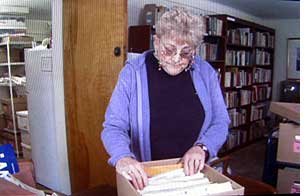 There
are the several major figures spotlighted; perhaps the most important is
Peggy Ames. Peggy's records from the archives were the first that Davis
showed to the director. Peggy was a transgender woman who lived the first
52 years of her life as a man. He became a woman during the 1970s and identified
as a lesbian; her family declared her "dead" and children on her street
threw rocks at her. Peggy was so much an "alien" that even the local lesbian
group rejected her. Davis' friends, Don Licht and Jim Haynes (who jump-started
the archives with Davis by donating all of Peggy's papers), remark that
"pronouns get confused" and that they knew so little about transexualism
in those days. Many selections from her letters are read aloud by various
readers and the contents are heartbreaking. There
are the several major figures spotlighted; perhaps the most important is
Peggy Ames. Peggy's records from the archives were the first that Davis
showed to the director. Peggy was a transgender woman who lived the first
52 years of her life as a man. He became a woman during the 1970s and identified
as a lesbian; her family declared her "dead" and children on her street
threw rocks at her. Peggy was so much an "alien" that even the local lesbian
group rejected her. Davis' friends, Don Licht and Jim Haynes (who jump-started
the archives with Davis by donating all of Peggy's papers), remark that
"pronouns get confused" and that they knew so little about transexualism
in those days. Many selections from her letters are read aloud by various
readers and the contents are heartbreaking. |
|
 Another
star player is John Minzer, AKA Tangara, Buffalo's legendary female impersonator
whose career dates back to the late 1920s. Tangara, who died before the
film was completed, was 94. His stories include working with Mae West (who
taught him how to walk like a woman with attitude) and tales of police harassment,
arrests, and being assaulted. When asked if he was ever in love, Tangara
replies "I suppose I was, it was so long ago I don't remember." Tangara
made up his own rules and lived his life the way he wanted. Photographs
and home movies (including a performance of his signature song, "Red Hot
Nuts") show a grand diva in drag who never gave in. Another
star player is John Minzer, AKA Tangara, Buffalo's legendary female impersonator
whose career dates back to the late 1920s. Tangara, who died before the
film was completed, was 94. His stories include working with Mae West (who
taught him how to walk like a woman with attitude) and tales of police harassment,
arrests, and being assaulted. When asked if he was ever in love, Tangara
replies "I suppose I was, it was so long ago I don't remember." Tangara
made up his own rules and lived his life the way he wanted. Photographs
and home movies (including a performance of his signature song, "Red Hot
Nuts") show a grand diva in drag who never gave in. |
|
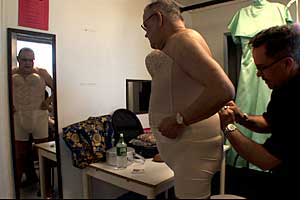 An
added poignancy is achieved with the knowledge that one of Tangara's interviewers,
Davis' friend Dan Winter, is also a drag performer himself. Buffalo audiences
will undoubtedly recognize him immediately, but national audiences will
be unaware of Dan's alter ego until an absolutely lovely sequence, later
in the film, shows Dan dressing up as Vicky Vogue in preparation for one
of his many charity vaudevilles. Vicki is well respected in Buffalo and,
at 70, is probably our oldest living drag performer. His story, another
filled with joy, sadness and the courage to live life on his own terms,
is fittingly preserved in Swimming With Lesbians
for the ages. An
added poignancy is achieved with the knowledge that one of Tangara's interviewers,
Davis' friend Dan Winter, is also a drag performer himself. Buffalo audiences
will undoubtedly recognize him immediately, but national audiences will
be unaware of Dan's alter ego until an absolutely lovely sequence, later
in the film, shows Dan dressing up as Vicky Vogue in preparation for one
of his many charity vaudevilles. Vicki is well respected in Buffalo and,
at 70, is probably our oldest living drag performer. His story, another
filled with joy, sadness and the courage to live life on his own terms,
is fittingly preserved in Swimming With Lesbians
for the ages. |
|
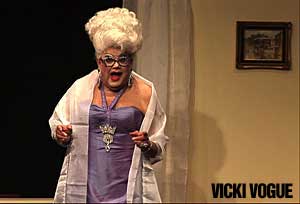 Davis
states that she never had a sense of "my people" until her early activist
days when she marched on the State Capital in 1971. It was then that she
stopped being afraid and became "energized." Stories like hers are vital.
Young gay people have no sense of our rich history and it is up to us to
create it and to preserve it. Straight society can see monuments to men
like George Washington everywhere, while our history remains invisible.
During a very telling sequence, Davis (and others) are profoundly disappointed
when a delegation from Buffalo State College seems non-committal about housing
the archives at the university - and oblivious to its importance. Davis
states that she never had a sense of "my people" until her early activist
days when she marched on the State Capital in 1971. It was then that she
stopped being afraid and became "energized." Stories like hers are vital.
Young gay people have no sense of our rich history and it is up to us to
create it and to preserve it. Straight society can see monuments to men
like George Washington everywhere, while our history remains invisible.
During a very telling sequence, Davis (and others) are profoundly disappointed
when a delegation from Buffalo State College seems non-committal about housing
the archives at the university - and oblivious to its importance. |
|
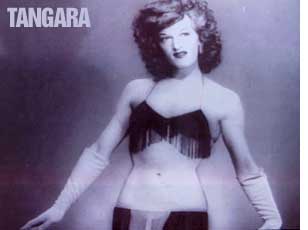 Swimming
With Lesbians
sometimes paints a bleak picture of Buffalo and it is in this regard that
I hope the filmmakers might tweak it a bit to show that what was then
is not necessarily now, and that a vibrant gay community exists
here today. The joy of a recent Pride Parade is contrasted with a lone,
and loony, protester with a bullhorn who finally screams at the camera "You're
wicked filth, all of you!" At this point, Davis remarks how a Pride Parade
must symbolize both "pride" and "protest" because there are still
people out there who hate us. Buffalo was not always a good place to be
gay; from 1978 to 1993 we had a homophobic mayor who thought nothing of
making comments in the press like "I don't want no fruits in the theatre
district." Swimming
With Lesbians
sometimes paints a bleak picture of Buffalo and it is in this regard that
I hope the filmmakers might tweak it a bit to show that what was then
is not necessarily now, and that a vibrant gay community exists
here today. The joy of a recent Pride Parade is contrasted with a lone,
and loony, protester with a bullhorn who finally screams at the camera "You're
wicked filth, all of you!" At this point, Davis remarks how a Pride Parade
must symbolize both "pride" and "protest" because there are still
people out there who hate us. Buffalo was not always a good place to be
gay; from 1978 to 1993 we had a homophobic mayor who thought nothing of
making comments in the press like "I don't want no fruits in the theatre
district." |
|
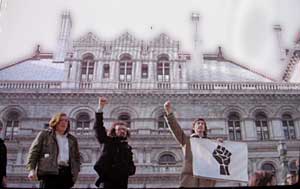 But
we've come a long way and this film reminds us of that. Adding the tales
of these pioneers to the history books is an imperative. Each is unique
and so is this film's approach to them. There is a little bit of quirkiness
to the proceedings, a sense of the offbeat to subvert the usual documentary
process. We learn, during a sequence filmed at a daring art exhibition,
that Davis has no problem being identified as an "S&M dyke." In contrast,
she and her partner live out in the suburbs - "We wanted a pool," she insists,
as Vicki gently chides her about leaving the city, and invites Vicki to
come swim with lesbians because they won't care what you look like. The
director doesn't forget to be playful; early on when Davis plays the 45
RPM single of "Stonewall Nation," the record skips the first time. But
we've come a long way and this film reminds us of that. Adding the tales
of these pioneers to the history books is an imperative. Each is unique
and so is this film's approach to them. There is a little bit of quirkiness
to the proceedings, a sense of the offbeat to subvert the usual documentary
process. We learn, during a sequence filmed at a daring art exhibition,
that Davis has no problem being identified as an "S&M dyke." In contrast,
she and her partner live out in the suburbs - "We wanted a pool," she insists,
as Vicki gently chides her about leaving the city, and invites Vicki to
come swim with lesbians because they won't care what you look like. The
director doesn't forget to be playful; early on when Davis plays the 45
RPM single of "Stonewall Nation," the record skips the first time. |
|
|
Local audiences will feel like they are at a family reunion, others may be amazed to learn that these things actually happened in Buffalo! At this writing, Swimming With Lesbians is not yet available for purchase and may still be, in part, a work in progress as it makes the rounds at festivals. Swimming With Lesbians certainly captures some important voices and I sincerely hope that Mr. Marshall finds a distributor because I believe this to be a very important contribution to our collective gay history.
Click Here for
Madeline Davis' Archives The Film's Official
Site: |